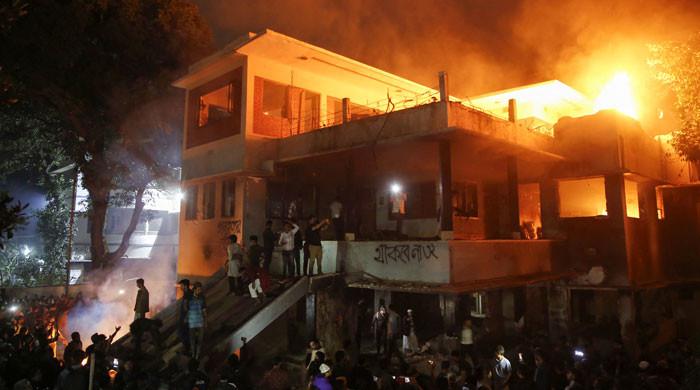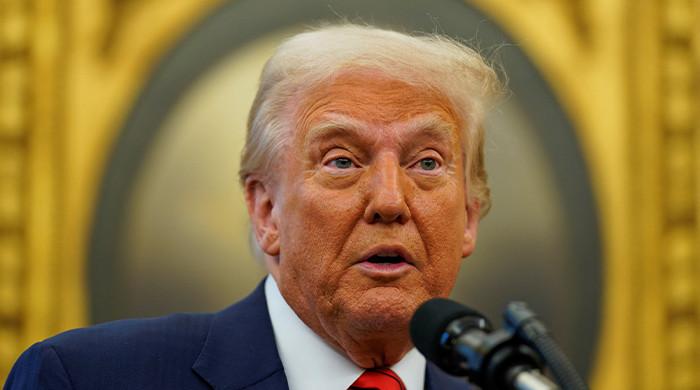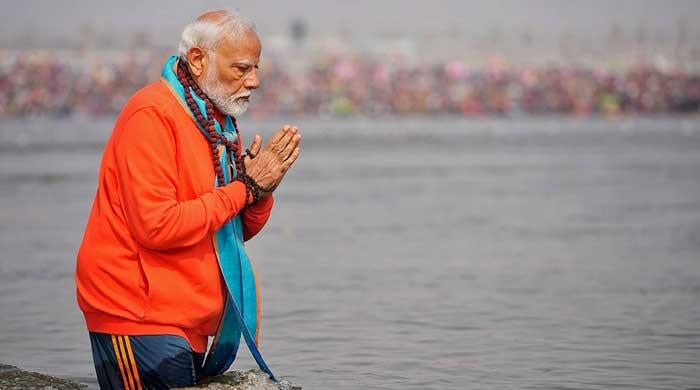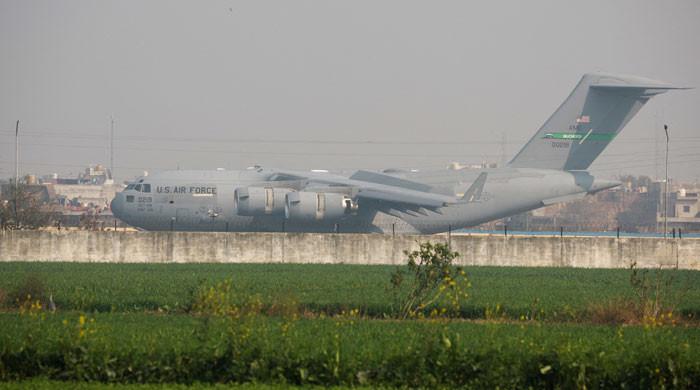Embraced as an old friend, Biden arrives in Israel at start of Mideast visit
Biden to spend 2 days in Jerusalem for talks with Israeli leaders before meeting Palestinian President
July 13, 2022
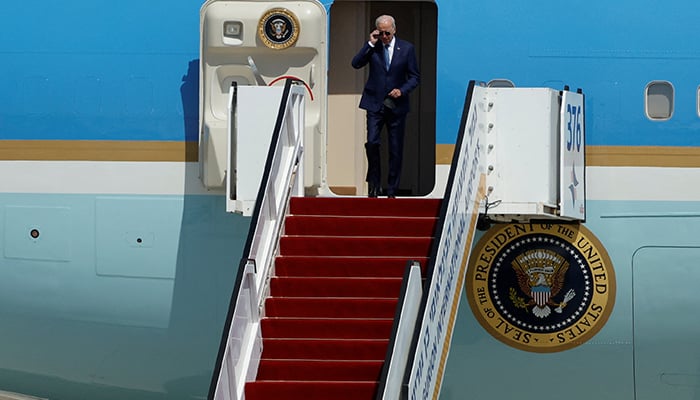
- US President Joe Biden meets Israeli Prime Minister Yair Lapid.
- Biden's trip aims to deepen Israel's integration in the region.
- He will spend two days in Jerusalem for talks with Israeli leaders.
TEL AVIV: US President Joe Biden arrived on Wednesday in Israel, which embraced him as an old friend on the first leg of a high-stakes trip dominated by efforts to bring it closer to Saudi Arabia and to persuade Washington's Gulf allies to pump more oil.
Arriving on Air Force One at Ben Gurion Airport, whose tarmac he first trod in 1973 as a senator, Biden bumped fists with Israeli Prime Minister Yair Lapid and, in a speech, described the United States' connection with the country as "bone-deep".
"You do not need to be a Jew to be a Zionist," Biden added while restating his support for a two-state solution which he described as "the best hope for Israel and the Palestinians".
It is Biden's 10th visit to Israel, which has stepped carefully around disagreements with Washington over Iranian nuclear diplomacy and long-stalled Palestinian statehood negotiations.
"Your relationship with Israel has always been personal," Lapid said in a speech, calling Biden "a great Zionist and one of the best friends Israel has ever known".
Biden will spend two days in Jerusalem for talks with Israeli leaders before meeting Palestinian President Mahmoud Abbas on Friday in the occupied West Bank.
Afterwards, he will take a direct flight from Israel to Jeddah, Saudi Arabia — a first for an American president — on Friday for talks with Saudi officials and to attend a summit of Gulf allies.
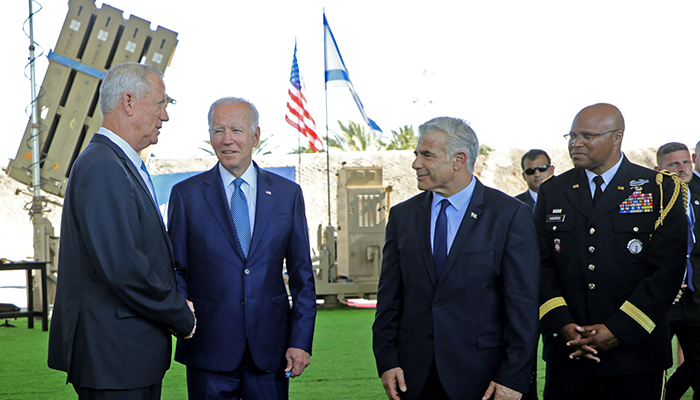
US officials say the trip — Biden's first to the Middle East as president — could produce more steps toward normalization between Israel and Saudi Arabia, historic foes but also two of America's strongest allies in the turbulent region.
"We're making steps gradually toward that end," said an Israeli official, adding that the fact Biden will fly directly from Israel to Saudi Arabia "encapsulates a lot of the dynamics that have been evolving over the last months".
Biden's trip aims to promote regional stability, deepen Israel's integration in the region and counter Iranian influence and aggression by Russia and China.
Amid Israel's stalemate with the Palestinians, US National Security Adviser Jake Sullivan reiterated Washington's desire for the reopening of a Jerusalem consulate shut down by the former US administration of President Donald Trump. The consulate had served the Palestinians, who want East Jerusalem as the capital of a future state.
"Obviously that requires engagement with the Israeli government. It requires engagement with the Palestinian leadership as well. And we will continue that engagement on this trip," Sullivan told reporters aboard Air Force 1.
Wasel Abu Youssef, a member of the Palestine Liberation Organisation (PLO), said in response: "It's much ado about nothing."
Pressure over Saudi visit
Biden, under pressure at home to bring down soaring gasoline prices that have damaged his standing in public opinion polls, is expected to press Gulf allies to expand oil production to help bring those prices down.
He said details about a price cap on oil from Russia were still being worked out with European partners but he warned that signs of a deepening relationship between Russia and Iran should be seen as a profound threat.
A centrepiece of Biden's visit will be talking in Jeddah with Saudi leaders including Saudi Crown Prince Mohammed bin Salman, accused by the US intelligence community of being behind the 2018 murder of Washington Post journalist Jamal Khashoggi.
The meeting is a reversal of Biden's previous position of making Saudi Arabia a "pariah" for the Khashoggi death. How the White House handles the optics of the meeting and whether photos will be released of it will be closely watched.
Aides say he will bring up human rights concerns while in Saudi Arabia, but he has nonetheless drawn fire from a wide array of critics.
"Biden needs the Saudis to increase their oil production to help keep global energy prices in check," wrote Washington Post publisher Fred Ryan in an opinion piece on Tuesday. "The trip sends the message that the United States is willing to look the other way when its commercial interests are at stake."
At Ben Gurion Airport, Biden was to receive a briefing from Israeli defence officials on the US-supported Iron Dome defense system and a new laser-enabled system called Iron Beam.
He will pay his respects at Yad Vashem, Israel's memorial to Holocaust victims in World War Two.
Israel has been jolted by internal political strife with previous prime minister Naftali Bennett's coalition collapsing in June.
This has left Lapid as caretaker prime minister until new elections are held later this year. He and Biden will give a joint news conference on Thursday.
Biden will also meet past prime minister Benjamin Netanyahu, now the opposition leader.
Outreach to Palestinians
Biden's talks with Abbas will mark the highest level of face-to-face contact between the United States and the Palestinians since Trump took a tough approach to the Palestinians upon taking office in 2017.
Tensions are high between Israel and the Palestinians over the killing of Palestinian-American journalist Shireen Abu Akleh in May.
Her family, having accused the United States of providing impunity for Israel over her killing, has asked to meet Biden during his trip to the region this week. US Secretary of State Anthony Blinken had spoken with the family, Sullivan said, and invited them to a meeting.
The Palestinians, while appreciating the resumption of ties under Biden, want him to make good on pledges to reopen the Jerusalem consulate.
They also want the United States to remove the PLO from the US list of terrorist organizations, preserve the historic status quo in Jerusalem and curb Jewish settlement expansion in the West Bank.
Israeli officials said Biden's visit will include what they called the Jerusalem Declaration on the US-Israel Strategic Partnership.
One official said the joint declaration "takes a very clear and united stand against Iran, its nuclear program and its aggression across the region and commits both countries to use all elements of their national power against the Iranian nuclear threat."
Biden is likely to face questions from Israel and from Gulf states such as Saudi Arabia and the United Arab Emirates about the wisdom of his attempts to revive the Iran nuclear deal.






